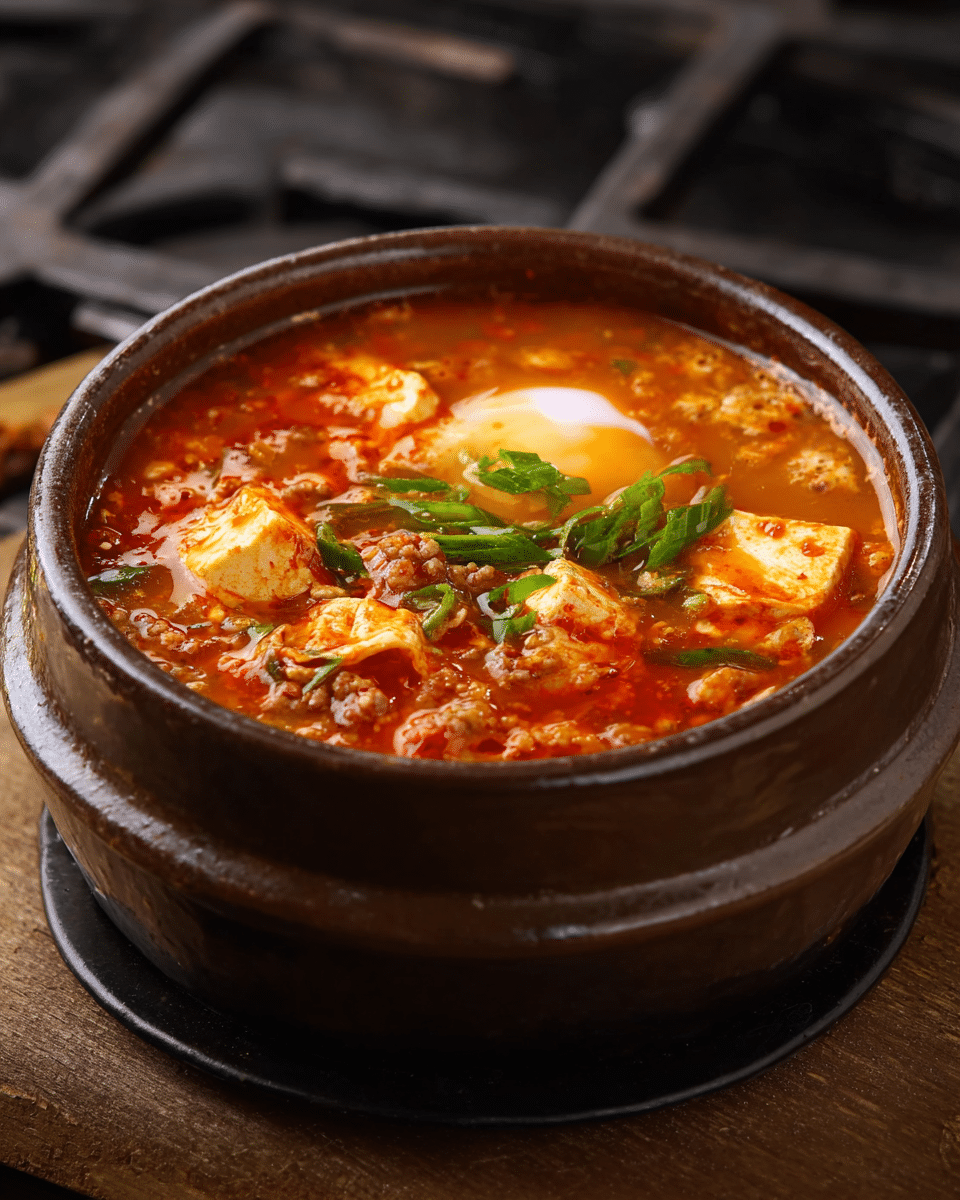Korean Spicy Soft Tofu Stew, or Sundubu Jjigae, is a rich, comforting dish that perfectly balances the heat of gochujang and gochugaru with the smooth, silky texture of tofu. The addition of kimchi gives it an extra layer of flavor, creating a deeply savory and spicy experience that will leave you craving more.
This dish is ideal for a cozy night in or when you need something warming and hearty. Whether you enjoy it with a poached egg or not, this stew provides a perfect base for customizing to your liking. The combination of spicy and savory flavors is incredibly satisfying, making it a must-try for anyone who loves Korean cuisine or hearty stews.
Full recipe:
Ingredients:
-
1 tablespoon sesame oil
-
1/2 pound ground pork (or beef)
-
2 cloves garlic, minced
-
1/2 onion, chopped
-
1 tablespoon gochujang (Korean chili paste)
-
1 teaspoon gochugaru (Korean chili flakes)
-
4 cups dashi broth (or water)
-
1 tablespoon soy sauce
-
1 teaspoon sugar
-
1/2 cup kimchi, chopped
-
1 block soft tofu (silken tofu)
-
1 egg (optional)
-
2 green onions, chopped
-
Salt and pepper to taste
Directions:
-
Heat sesame oil in a large pot over medium heat.
-
Add the ground pork and cook until browned, about 5 minutes.
-
Add garlic and onion, sautéing until the onion is soft and translucent.
-
Stir in gochujang and gochugaru, allowing them to coat the meat and vegetables.
-
Pour in the dashi broth, soy sauce, and sugar, and bring to a simmer.
-
Add the kimchi and bring the stew back to a simmer. Let it cook for another 5-10 minutes to let the flavors meld.
-
Gently add the tofu to the stew, breaking it up into large chunks. Let the tofu warm through.
-
If desired, crack an egg into the pot and let it poach in the broth for about 3-5 minutes.
-
Garnish with chopped green onions, and season with salt and pepper to taste before serving.
Prep Time: 10 minutes | Cooking Time: 20 minutes | Total Time: 30 minutes | Kcal: 320 kcal | Servings: 2 servings
The Origins of Sundubu Jjigae
Sundubu Jjigae has deep roots in Korean culinary history, often considered a home-cooked staple. The word “Sundubu” refers to the silken, or soft tofu, which is the key ingredient in this dish. It is said that Sundubu Jjigae was originally made by farmers who would make use of fresh tofu and simple, accessible ingredients. Over the years, the dish evolved, incorporating different proteins, vegetables, and seasoning.
While there are variations of Sundubu Jjigae across different regions of Korea, the basic concept remains the same: a comforting, spicy broth filled with soft tofu, vegetables, and sometimes meat. The dish’s popularity in Korea has only grown over time, and it is now enjoyed by people of all ages across the world.
The Role of Tofu in Sundubu Jjigae
Tofu is the star of Sundubu Jjigae, offering a delicate texture that contrasts beautifully with the bold flavors of the broth. Silken tofu, known as “sundubu,” is preferred in this stew because of its soft, creamy consistency that easily absorbs the flavors of the soup. Unlike firmer tofu, which can be a bit dense, silken tofu gently breaks apart in the soup, creating a velvety texture that enhances the overall experience.
In Korean cuisine, tofu is not only valued for its ability to soak up flavors but also for its health benefits. Tofu is high in protein and low in fat, making it a great option for anyone looking to add more plant-based proteins to their diet. Additionally, the soft tofu in Sundubu Jjigae brings a unique richness to the broth without overwhelming the dish with heaviness.
The Importance of Broth and Seasoning in Sundubu Jjigae
One of the most distinctive features of Sundubu Jjigae is the flavor-packed broth. The base of the soup is typically made with dashi or a simple broth made from water, soy sauce, and a few other key ingredients. However, what really sets Sundubu Jjigae apart is the use of gochujang (Korean chili paste) and gochugaru (Korean chili flakes), which give the broth its characteristic spice and depth of flavor.
Gochujang is a fermented paste made from chili peppers, rice, and other ingredients, which contributes a complex, umami flavor to the stew. Gochugaru, on the other hand, provides the dish with a more traditional, smoky heat that isn’t overpowering but gives the stew its signature kick. Together, these two ingredients provide the perfect balance of heat and flavor, making Sundubu Jjigae both comforting and exciting to eat.
Protein Variations in Sundubu Jjigae
While the traditional version of Sundubu Jjigae is often made with ground pork, it can easily be adapted to suit a variety of tastes. Ground beef is another common protein used in this dish, providing a slightly different flavor profile but still contributing to the rich, savory broth. For those who prefer a lighter option, seafood, such as shrimp or clams, can be substituted to create a unique and flavorful variation.
Vegetarians and vegans can enjoy Sundubu Jjigae as well. By omitting the meat and using a vegetable-based broth, the dish can still maintain its depth of flavor. Tofu, being the main ingredient, ensures that the dish remains hearty and filling. Additionally, vegetables like mushrooms, zucchini, or spinach can be added to enhance the dish with more texture and flavor.
Sundubu Jjigae: A Versatile Dish for Every Occasion
One of the best things about Sundubu Jjigae is its versatility. Whether you’re craving a quick lunch or a more elaborate dinner, this dish can easily be customized to suit your needs. It’s also a great dish to prepare when you’re looking for something warm and comforting during the colder months, but it’s delicious year-round.
When served in the traditional stone pot, Sundubu Jjigae is an experience in itself. The pot retains heat, keeping the dish warm throughout the meal, and adds to the visual appeal of the stew. The stew is often served with a side of steamed rice, which can be mixed into the soup, adding a satisfying texture and making the dish even more filling.
This dish is ideal for family meals, gatherings, or casual get-togethers, as it can easily be made in larger quantities. It’s also perfect for meal prep, as it keeps well in the fridge and can be reheated for a tasty meal throughout the week.
Sundubu Jjigae for Health and Wellness
Sundubu Jjigae is not only delicious but also packed with nutrients. The tofu provides a great source of protein, which is essential for muscle repair and overall body function. The chili paste and flakes add a touch of spice, which is known to boost metabolism and promote good digestion. Additionally, kimchi, often added to the stew, is a fermented food rich in probiotics, which are beneficial for gut health.
The dish can also be made healthier by adjusting the ingredients to suit specific dietary preferences. For example, using less oil or opting for a low-sodium soy sauce can make the dish even lighter. If you’re looking to reduce calories, simply skip the egg or use a plant-based egg alternative.
Conclusion: Why You Should Try Sundubu Jjigae
Korean Spicy Soft Tofu Stew, or Sundubu Jjigae, is a dish that has captured the hearts of many, thanks to its balance of comforting textures and bold, spicy flavors. Whether you are familiar with Korean cuisine or new to it, this dish offers a unique culinary experience that is both satisfying and versatile. With the right combination of tofu, broth, and seasoning, Sundubu Jjigae can be customized to suit anyone’s tastes, making it a must-try recipe for food lovers everywhere.
Not only is it packed with flavor, but it’s also a great dish to add to your cooking repertoire for its ease and adaptability. So, whether you’re craving a spicy meal, need something to warm you up on a cold day, or simply want to try a new dish, Sundubu Jjigae is the perfect choice. Give it a try, and you’ll soon understand why this dish is a favorite among Korean food enthusiasts worldwide.






